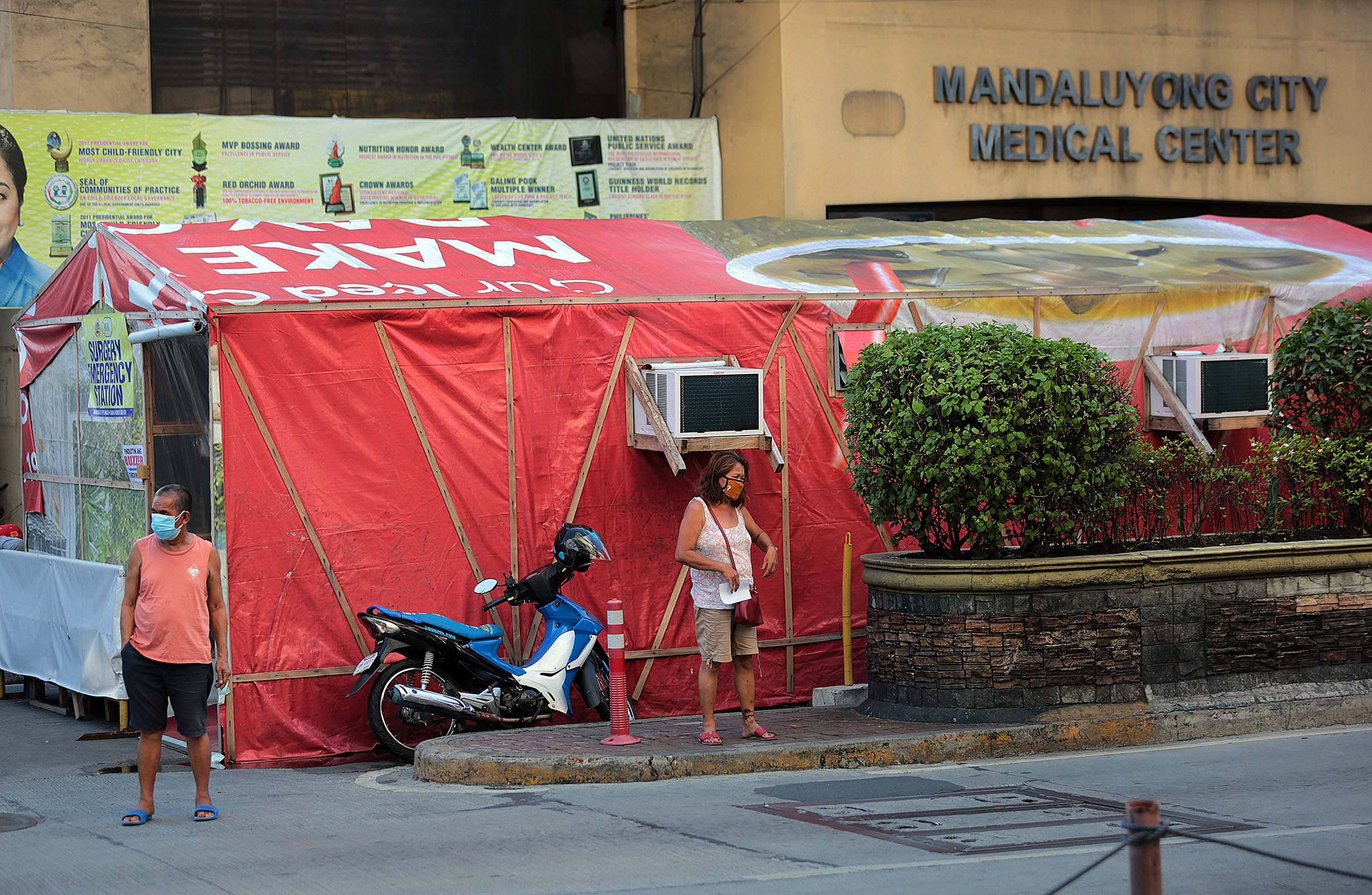
ADDITIONAL SPACE Patients’ companions wait outside a tent pitched on the sidewalk in front of Mandaluyong City Medical Center along Boni Avenue on Thursday. The tent is where non-COVID-19 patients are examined prior to admission. The Department of Health has directed hospitals in Metro Manila to expand their COVID-19 capacity up to 70 percent to handle more patients in the event of a surge in new coronavirus infections. —GRIG C. MONTEGRANDE
The Department of Health (DOH) “should have been clearer” about the guidelines for home quarantine from the start of the new coronavirus outbreak, Malacañang said on Thursday.
Presidential spokesperson Harry Roque said the government was now “rectifying” the situation—a spike in coronavirus infections arising from the “vague guidelines” for self-isolation by people with mild cases of COVID-19 or suffering from the disease caused by the new coronavirus but showing no symptoms.
Reason for spike in cases
“I think it was not clear when the DOH said asymptomatic and mild patients can stay home. They did not clarify that you must have your own bedroom and bathroom,” Roque told a news briefing.
He said the vague guidelines were one of the reasons for the rising COVID-19 cases, which hit 74,390 on Thursday with the addition of 2,200 more infections.
Of the additional cases, 1,314 were patients who tested positive for the coronavirus in the last three days and 886 were people who tested positive four days ago or earlier, according to the DOH.
Metro Manila still accounted for the bulk of the additional cases, with 1,546, followed by Cebu (246), Laguna (83), Rizal (61) and Cavite (48).
New infections
The DOH said 760 more patients had recovered, bringing the total number of COVID-19 survivors to 24,383. But the death toll increased to 1,871 with the deaths of 28 more patients.
It was only in recent days, when new infections were already topping 1,000 a day, that the DOH said mild and asymptomatic patients could self-isolate provided they had their own rooms and bathrooms.
“But we are rectifying it now,” Roque said, adding that the government was intensifying its pool testing and building more isolation centers.
On July 12, the Inter-Agency Task Force for the Management of Emerging Infectious Diseases, the temporary government body overseeing the Duterte administration’s response to the new coronavirus outbreak, said it was discouraging home quarantine for patients who did not have their own rooms and bathrooms.
The government also launched a program for the transfer of mild and asymptomatic cases to isolation centers run by the state or by local governments.
Building capacity
“We see that less than two weeks after we announced [the program], our isolation centers [were] getting [full]. That’s how many positive cases we have because of intensified testing daily,” Roque said.
There are six isolation centers in Metro Manila that are run by the national government. These isolation centers have a combined capacity for 3,000 patients. In addition, local governments in the metropolis have their own isolation centers and these have a combined capacity for 10,000 cases.
To boost the government’s capacity, the Department of Tourism has booked 2,000 rooms in hotels in the metropolis for use by mild and asymptomatic cases.
Roque said the Department of Public Works and Highways was building more isolation centers.
Metro Manila is under general community quarantine up to the end of July. Mass gatherings are prohibited under the quarantine rules.
Roque said he would suggest to the coronavirus response task force to reimpose the requirement for passes in areas under general community quarantine to discourage people from going out on nonessential movement without reverting to lockdown.
Also on Thursday, the Philippine National Police said it would send officers to the villages to enforce the rule on the wearing of masks.
Team leaders
Police Lt. Gen. Guillermo Eleazar, chief of law enforcement for the coronavirus response, said policemen would serve as team leaders of the village security officers in enforcing public health measures.
The DOH has blamed the rise in coronavirus infections on the people’s failure to observe health measures, and President Duterte has ordered the police to arrest anyone not wearing a face mask.
“The presence of policemen is not only a proven crime deterrent, but also compels civilians to behave,” Eleazar said, adding that observing public health measures was necessary to halting the spread of the coronavirus. —WITH REPORTS FROM PATRICIA DENISE M. CHIU AND NESTOR CORRALES